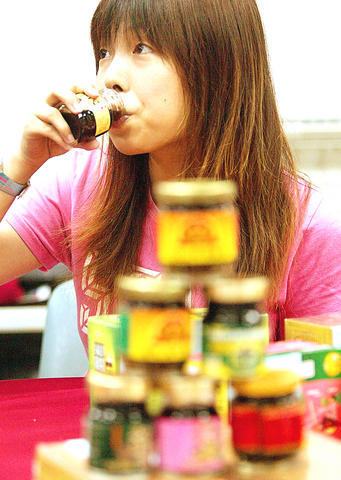Thirty percent of the bottled essence of chicken sold in the nation does not show the correct amount of sodium it contains, which might mislead the public into consuming too much of the electrolyte, the Consumers' Foundation (
The foundation tested 30 samples of chicken essence in March.
It found that nine of them had incorrect sodium content labeling, which violates Article 19 of the Act Governing Food Sanitation (食品衛生管理法).

PHOTO: FANG PIN-CHAO, TAIPEI TIMES
Violators are subject to fines of between NT$30,000 (US$910) and NT$150,000 and must make improvements within a given period of time.
Since most of the sodium contained in food is absorbed by the body, patients with high blood pressure, heart diseases or kidney diseases should carefully control their sodium intake, the non-profit organization said.
Eleven of the samples did not provide a recommended daily intake. The foundation suggested that manufacturers print the information on the packaging as a friendly reminder to consumers.
According to the standards for the labeling of packaged foods the maximum daily intake of sodium is set at 2,400mg.
Tests on the 30 samples showed that they contain between 30mg and 230mg of
sodium per 100 milliliters of chicken essence.
Although the sodium content in the samples are lower than the suggested
daily intake, consumers are still likely to absorb more sodium from other
food products, which underlines the importance of chicken essence
manufacturers' correctly labeling their products, the foundation said.

Taiwan’s rapidly aging population is fueling a sharp increase in homes occupied solely by elderly people, a trend that is reshaping the nation’s housing market and social fabric, real-estate brokers said yesterday. About 850,000 residences were occupied by elderly people in the first quarter, including 655,000 that housed only one resident, the Ministry of the Interior said. The figures have nearly doubled from a decade earlier, Great Home Realty Co (大家房屋) said, as people aged 65 and older now make up 20.8 percent of the population. “The so-called silver tsunami represents more than just a demographic shift — it could fundamentally redefine the

Businesses across the global semiconductor supply chain are bracing themselves for disruptions from an escalating trade war, after China imposed curbs on rare earth mineral exports and the US responded with additional tariffs and restrictions on software sales to the Asian nation. China’s restrictions, the most targeted move yet to limit supplies of rare earth materials, represent the first major attempt by Beijing to exercise long-arm jurisdiction over foreign companies to target the semiconductor industry, threatening to stall the chips powering the artificial intelligence (AI) boom. They prompted US President Donald Trump on Friday to announce that he would impose an additional

China Airlines Ltd (CAL, 中華航空) said it expects peak season effects in the fourth quarter to continue to boost demand for passenger flights and cargo services, after reporting its second-highest-ever September sales on Monday. The carrier said it posted NT$15.88 billion (US$517 million) in consolidated sales last month, trailing only September last year’s NT$16.01 billion. Last month, CAL generated NT$8.77 billion from its passenger flights and NT$5.37 billion from cargo services, it said. In the first nine months of this year, the carrier posted NT$154.93 billion in cumulative sales, up 2.62 percent from a year earlier, marking the second-highest level for the January-September

Asian e-commerce giant Shein’s (希音) decision to set up shop in a historic Parisian department store has ruffled feathers in the fashion capital. Anger has been boiling since Shein announced last week that it would open its first permanent physical store next month at BHV Marais, an iconic building that has stood across from Paris City Hall since 1856. The move prompted some French brands to announce they would leave BHV Marais, but the department store had already been losing tenants over late payments. Aime cosmetics line cofounder Mathilde Lacombe, whose brand was among those that decided to leave following